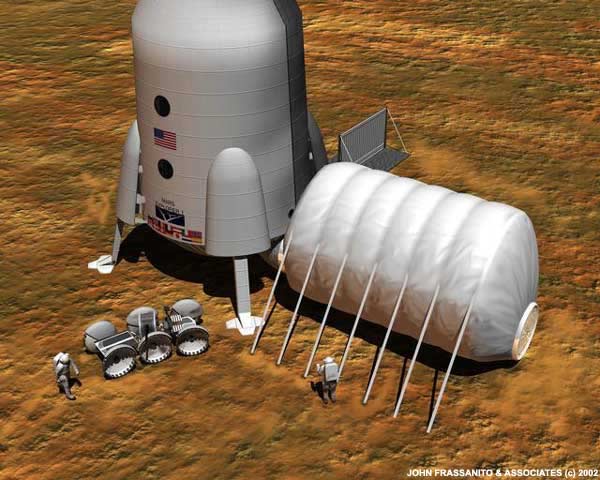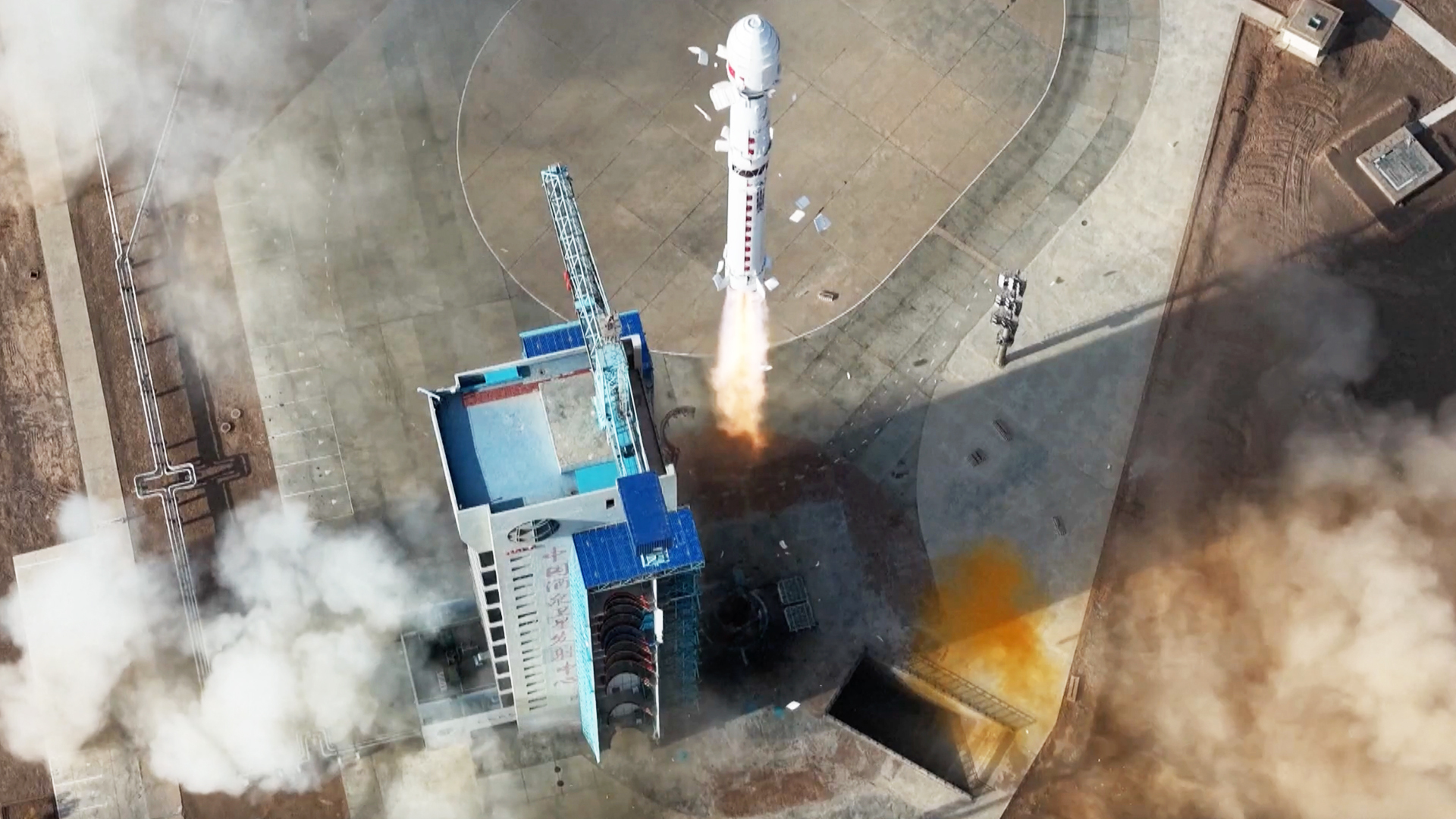Cyborg Astronauts Needed to Colonize Space

Scientistshave warned for decades that humans are straining the Earth. The globalpopulation is increasing, economies are expanding and consumptiondoesn'tappear to be slowing.
Whilesave-the-planet campaigns are asking people to save energy, conservewater,recycle and even go vegetarian, some scientists are thinking literallyout ofthis world by suggesting that humans may eventually have to consider leavingEarth if they are to survive as a species.
Inthe September issue of Endeavour, senior curator atthe SmithsonianNational Air and Space Museum Roger Launius takes a look at thehistoricaldebate surrounding human colonizationof the solar system and how human biology will have to adaptto such extremespace environments.
Colonizingthe solar system
Experimentshave shown that certain life forms can survive in space.
Recently,British scientists found that bacteria living on rocks taken fromBritain'sBeer village were able to survive 553 days in space, on the exterior ofthe InternationalSpace Station. The microbes returned to Earth alive, provingthey couldwithstand the harsh environment.
Humans,on the other hand, are unable to survive beyond about a minute and ahalf inspace without significant technological assistance. Other than somequick tripsto the moon and the ISS, astronauts haven't spent too much time too farawayfrom Earth.
Breaking space news, the latest updates on rocket launches, skywatching events and more!
Scientistsdon't know enough yet about the dangers of long-distance space travelon humanbiological systems. A one-way trip to Mars, for example, would takeapproximately six months.
Thatmeans astronauts will be in deep space for more than a year withpotentiallylife-threatening consequences.
"Ifit's about exploration, we're doing that very effectively with robots,"Launius said. "If it's about humans going somewhere, then I think theonlypurpose for it is to get off this planet and become a multi-planetaryspecies."
Launiusisn't the only person who envisions humans leaving Earth. AcclaimedBritishphysicist StephenHawking recently discussed his own thoughts on how the humanrace wouldsurvive.
"Ibelieve that the long-term future of the human race must be in space,"Hawking told the Big Think website in August. "It will be difficultenoughto avoid disaster on planet Earth in the next hundred years, let alonethe nextthousand, or million. The human race shouldn't have all its eggs in onebasket,or on one planet."
Ifhumans are to colonize other planets, Launius said it could wellrequire the"next state of human evolution" to create a separate human presencewhere families will live and die on that planet.
Inother words, it wouldn't really be Homo sapien sapiens that would beliving in thecolonies, it could be cyborgs?a living organism with a mixture oforganic andelectromechanical parts?or in simpler terms, part human, part machine.
Tobe a space cyborg
Bydefinition, cyborgs are not a thing of the future, but very much athing of thepresent. Launius classifies himself as a cyborg because he relies onmedicaltechnology to sustain and enhance his life.
"Thereare cyborgs walking about us," Launius said. "There are individualswho have been technologically enhanced with things such as pacemakersandcochlea ear implants that allow those people to have fuller lives. Iwould notbe alive without technological advances."
Thepossibility of using cyborgsfor space travel has been the subject of research for atleast half acentury.
Aninfluential article published in 1960 by Manfred Clynes and NathanKline titled"Cyborgs and Space" changed the debate. According to them, there wasa better alternative to recreating the Earth's environment in space,thepredominant thinking during that time. The two scientists compared thatapproach to "a fish taking a small quantity of water along with him tolive on land." They felt that humans should be willing to partiallyadaptto the environment to which they would be traveling.
"Alteringman's bodily functions to meet the requirements of extraterrestrialenvironments would be more logical than providing an earthlyenvironment forhim in space," Clynes and Kline wrote.
Eventhough it may be both logically and technologically possible, theethicalquestion is whether it should be done.
"Itdoes raise profound ethical, moral and perhaps even religious questionsthathaven't been seriously addressed," Launius said. "We have a ways togo before that happens."
GrantGillett, a professor of medical ethics at the Otago Bioethics Center oftheUniversity of Otago Medical School in New Zealand said addressing theethicalissue is really about justifying the need for such an approach, theneed foraltering humans so significantly that they end up not entirely human intheend.
"(Whetherwe) should do it largely depends on if it's important enough forhumanity ingeneral," Gillett said. "To some extent, that's the justification."
Thegreater concern, according to Gillett, is that the cyborgs will likelyonlyhave a simulation of human behavior. What is important, he said, is notwhatthe cyborgs are made up of but what types of moral sensibilities andintuitionsare built in. And there is really no way of knowing for sure or even ofmakingreasonable guesses without doing a lot more work on the moral nature ofhumans.
"Ithink the danger is that we might end up producing a psychopath becausewe don'tquite understand the nature of cyborgs," Gillett said.
The future of cyborgs
Atfirst, as Launius points out in his article, NASA did support thisfield ofresearch, but that interest lasted for less than a decade.
Bythe late 1960s, the agency had distanced itself from the topic. Forone, thetechnology was not available at that time. However, some scientiststhink theproblem was more about public image. Would the American public of thatdecade?one that was arguably obsessed with the space program andidolizedastronauts?have accepted the "cyborgization of (the) astronaut corps"?
NASAstill isn't focusing much research on how to improve human biologicalsystemsfor space exploration. Instead, its Human Research Program is focusedon riskreduction: risks of fatigue, inadequate nutrition, health problems andradiation.
Whilefinancial and ethical concerns may have held back cyborg research,Launiusbelieves that society may have to engage in the cyborg debate againwhen spaceprograms get closer to launching long-term deep space explorationmissions.
"Ifour objective is to become space-faring people, it's probably going toforceyou to reconsider how to reengineer humans," Launius said.
Anuradha was a contributing writer to Space.com in the areas of Earth science, environmentalism, ecology, and space science. She was the former Director (International/Digital Media) at the Sri Lanka President’s Office and the Sri Lankan Government Spokesperson for the Commonwealth Heads of Government Meeting (CHOGM). Before that, she was the director of the Sri Lanka College of Journalism (SLCJ) before returning to Sri Lanka. Currently a Doctoral student and lecturer at the Newhouse School of Public Communications in Syracuse, New York.
